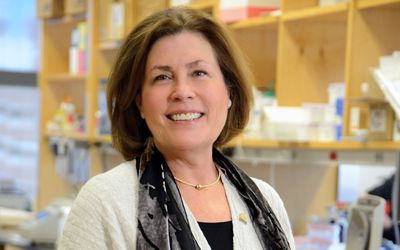IGS Director: U.S. Falling Behind in STEM Education
While the United States has been a leader in many advances in science, technology, engineering, and math (STEM), the state of education in this area and access in the U.S. is on the decline, warned Claire M. Fraser, PhD, director and founder of the University of Maryland School of Medicine’s (UMSOM) Institute for Genome Sciences, a pioneer in the field of microbial genomics, and the outgoing president of the American Association for the Advancement of Science.
Fraser’s sobering remarks about the state of U.S. STEM education and the future of a strong U.S. workforce in these fields were made to a University System of Maryland Board of Regents meeting Feb. 11 at the SMC Campus Center on the University of Maryland, Baltimore campus. She warned that the decline in STEM education is an urgent national problem that must be addressed with early interventions among schoolchildren and by encouraging and promoting access to underserved populations.

“We now have to come to grips with the fact that the world is changing and changing rapidly,” said Fraser, who also is the Dean’s Endowed Professor in the Department of Medicine at UMSOM.
Fraser warned that U.S. STEM education has already fallen behind other industrialized countries, which ultimately will greatly impact the health of the workforce and the greater population. She cited the pandemic as a key example of the importance of supporting education and training in critical science and health care fields.
“I think we have seen [the importance of STEM education] much more recently in developing vaccine platforms that allowed us to develop, approve, and deploy COVID vaccines in less than two years’ time,” she said.
Broadening Access to STEM Education
Interventions to promote, boost, and encourage students to move into STEM education and careers must start at the K-12 phase, with a focus on broadening access to underserved populations that have been overlooked, Fraser said. She further stated that there must be changes in the way academic institutions support those early in their careers.
“I would argue that we need to move in this direction with a sense of urgency — it’s not lowering the bar but broadening it,” she said.
Fraser warned that the COVID-19 pandemic has demonstrated that the general public has been swayed by misinformation campaigns, leading to many needless deaths. This alone is strong evidence for supporting STEM instruction and awareness early and broadly in education to ensure that science is at the foundation of public policy.
“It has become painfully obvious during the pandemic that anti-vaccine and anti-science rhetoric has grown strong and toxic,” Fraser said. “It’s so hard to come to terms with the fact that about 200,000 Americans lost their lives to COVID-19 because they trusted the misinformation propagated by social media more than the science or the biomedical scientists.”
Without steps by policymakers and educators to make STEM education and training more accessible to all U.S. students, misinformation campaigns will continue to sway the public on important public safety issues, she said. “Unless and until we do a better job of making STEM for all a priority, the politicization of science as a consequence of misinformation campaigns will continue,” Fraser said.
Reaching underserved populations also is critical to improving the country’s strength in STEM, Fraser added. “We have to commit to a goal that STEM education is for everybody,” she said.
Building Trust, Better Communication
Amidst the powerful web of misinformation campaigns, Fraser warned, scientists must do a better job of communicating their findings. This must also include building trust with the public. Currently, she said, the scientific community is “losing this battle.”
“We in science spend most of our time talking to each other. That’s not the kind of communication and engagement that’s going to make a difference,” Fraser said. “Ultimately, our ability to effectively transmit our scientific knowledge to an increasingly skeptical public requires us to understand why individuals and groups hold beliefs that are not supported by scientific evidence.
“And this is where more of us must play a more active role in engaging with the public in meaningful ways — actually getting out into our respective communities to work with civic leaders and local and state policymakers to address a range of issues that they deem to be relevant to them.”



